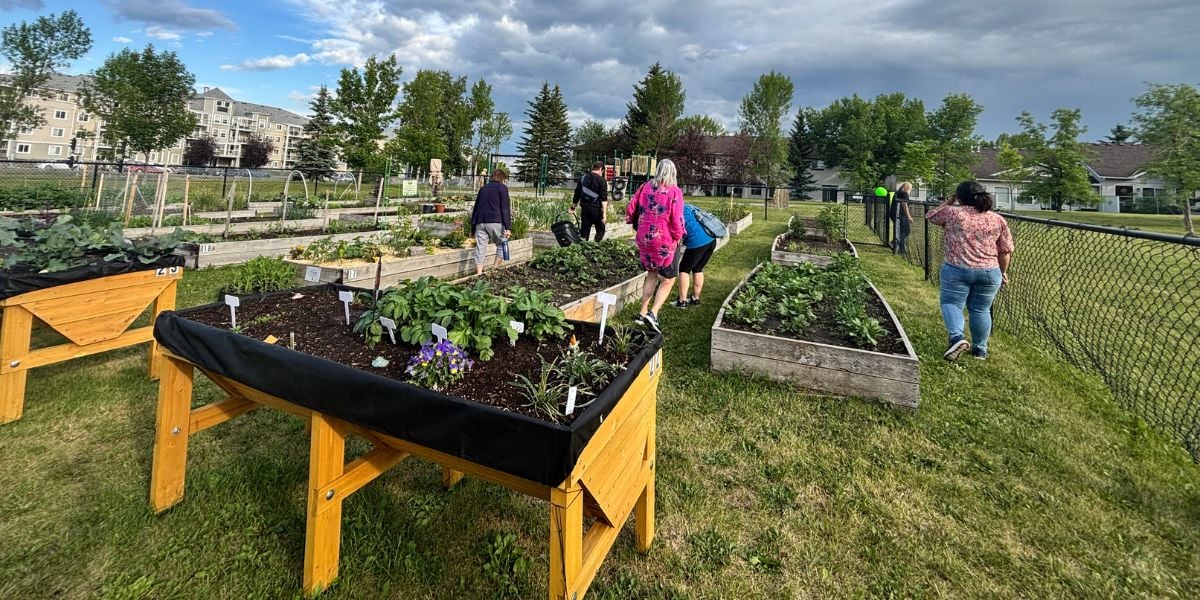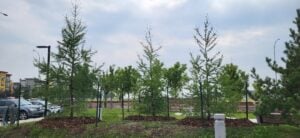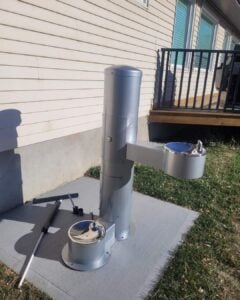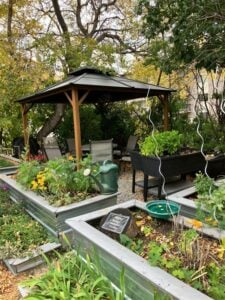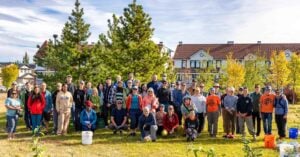
About ClimateReadyYYC Grants
ClimateReadyYYC offers grants to help communities take local climate action.
Our communities can be affected by climate change in so many ways, from extreme temperatures to wildfire smoke to food insecurity. We’re seeing signs of climate change everywhere. Through this grant program, we want to help communities build climate resilience through local climate adaption or mitigation projects.
This grant program helps communities prevent or prepare for the impacts of climate change while supporting people who are most at risk.
We challenge you to think of ways that you can help your community take climate action. Maybe you want to build a drought resistant community garden, organize an activity-based climate education, or add shade to a public space. Think of what your community needs and find creative, innovative and local solutions.
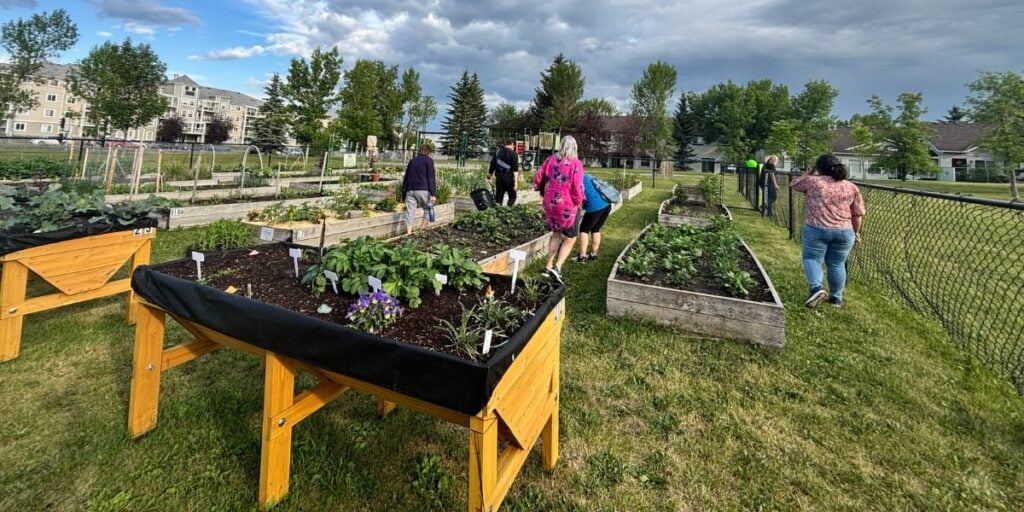
Project: Seasonal Resource Library
Somerset Bridlewood Community Association, ClimateReadyYYC 2025 Grant recipient
On this page
ClimateReadyYYC Grants offer up to $25,000 to help communities take local climate action.
Types of ClimateReadyYYC Grants
Eligibility
There are two streams of ClimateReadyYYC grants: small grants and large grants. Group of 3 or more community-minded individuals can only apply for the small grant stream. Registered organizations can apply for both grant types.
Please see the Grant Guidelines for Small or Large Grants and eligibility criteria.
- Help communites or vulnerable groups adapt to or mitigate specific climate issues or hazards.
- Engage the community by developing knowledge, resources or programming about climate resilience.
- Involve community collaboration or co-creation.
- Demonstrate sustainable impacts on the community or its residents.
- Projects can focus on either climate mitigation or adaptation projects.
Eligible expenses
| Ineligible Expenses
|
*If you are unsure if an expense is eligible, please contact Pooja, our Community Grants Implementor to discuss.
See the Grant Criteria for more information.
How to apply
Check out our Inspiration Toolkit and set up a time to discuss your project idea with our Community Grant Implementor, Pooja Shrestha.
There are two streams of ClimateReadyYYC grants. Select the grant stream you want prior to filling out an application. If you are unsure which grant stream to apply to reach out to Pooja Shrestha, our Community Grant Implementor.
Help us promote climate resilience in our communities by sharing your stories and climate action ideas.
Project Inspiration
This inspiration toolkit is designed to get you thinking about climate actions, and how you can address community concerns with innovative solutions. Each card has related resources or project examples on the back to give you more information.
Community gardens have many benefits, including promoting biodiversity, improving soil health, enhancing food security, helping to manage stormwater run off, and reducing urban heat.
Community Gardens:
Pollinator Gardens:
Edible Gardens:
Manage extreme precipitation and prevent flooding through natural flood barriers, landscaping or rain gardens. R
Resources:
Rain barrels capture and store rainwater for later use, reducing run off, alleviating flooding, and promoting sustainable water practices.
Water Conservation Resources:
Project Example:
Food production relies heavily on climate conditions. Building food resilience is about diversifying how people access food. For example,
Current Food System Projects:
Indigenous Landscaping uses local, native plants or traditional knowledge to create gardens that care for the land, support wildlife and feed people. Indigenous plants can lower garden maintenance, save water, support pollinators, adapt to local climate hazards, such as droughts, floods or extreme temperatures.
How-to Guides:
Resource Libraries can be stocked with seasonal items that can immediately help people reduce the affects of climate change, such as with cooling kits.
What is a Little Free Library?
Heat reflective paint helps reduce surface temperatures and can lower energy consumption.
Project Example:
Art Guide:
Learn from indigenous elders or knowledge keepers through holistic hands-on experiences. Land-based education can help people connect with culture, biodiversity, the environment and community through traditional skills, storytelling, shared lived experience and vernacular knowledge passed down from generations.
Resources:
Shading structures like pergolas, umbrellas or trees help to provide shade and make outdoor spaces more comfortable in extreme heat or hail.
Project Ideas:
Resource mapping and information sharing can help communities identify vulnerable areas and available resources, so that they can better prepare for climate events.
How-to Guide:
Using alternative sources of energy can help reduce emissions that cause climate change.
When applying for solar or clean energy projects, our review committee is looking for meaningful impact on people in your community and on the environment.
For example, if your community hub acts as a safe shelter (open to all) during emergencies or extreme weather events, you could apply to add solar panels that will power lighting and HVAC systems.
Resources:
Installation of water stations can help people and animals cope with extreme heat.
Project Example:
Whether you’re putting up a tent near your community park, joining a community market or hosting a community activity, climate pop-up events can be almost anything. Whether you want to combine a few different ideas (like handing our brochures, building a temporary misting station, or handing out cooling kits), or pick just one, pop-ups are a great option for temporary, impactful installations.
Example:
Composting recycles organic waste (food scraps, yard trimmings etc.) into nutrient rich compost. Not only does composting reduce waste going to landfills, it reuses organic nutrients to improve soil health, and helps promote food/plant growth. Compost programs or community-led composting workshops can be a great addition to community gardens.
Resources:
Community swaps are local events where people can exchange unwanted items (such as clothing, books, household goods, etc.) for things they need. This type of event promotes reusing items, reducing waste, saving money, and building community connections.
Resources:
Get your community involved and talking about climate change through workshops, climate fairs, neighbour day events, etc. Share information about local climate hazards, what people in your community can do to adapt or how they can contribute for community climate action.
Resources:
Frequently Asked Questions
Don’t worry. Pooja, our Community Grant Implementor, is here to help. She can walk you through the process, and help you create a strong application.
For even more support, you can also check out these documents outlining our grant guidelines for both Small Grants and Large Grants.
No. We developed the toolkit to help inspire climate adaptation projects. There are many more projects that could qualify for a ClimateReadyYYC Grant. Check out our Grant Criteria for more ideas.
If you have another great idea, we’d love to hear it! Talk to our Community Grant Implementor before applying to make sure your project idea meets our grant criteria.
Yes! All you need to do is find two other community-minded individuals to support your application.
If you’re having trouble finding like-minded individuals, try reaching out to your friends, neighbours or local Community Association. You can find your Community Association’s contact information here.
Climate change refers to a long-term change in the average weather patterns.
Climate resilience refers to our ability to cope with, respond to and recover from climate-driven hazardous events or trends, such as extreme heat or cold, floods, droughts, wildfires, etc.
Climate adaptation refers to how we can help both people and the environment cope with the impact of climate hazards and reduce our vulnerability.
Check out this helpful resource.
Climate change mitigation is about changing our actions, policies, programs and strategies to reduce the root causes of climate change.
Check out this helpful resource.
The effects of climate change – like heatwaves, droughts, wildfires and flooding – don’t affect everyone equally. Some people are more vulnerable to climate hazards, because of societal factors, such as race, gender, age, income, and ability.
Therefore, climate-equity exists to help ensure that people who are disproportionately impacted by climate change have equal access to, and can benefit from climate solutions.
Learn more about climate equity at: calgary.ca/environment/programs/equity
Contact Us
Pooja Shrestha
Community Grant Implimentor


